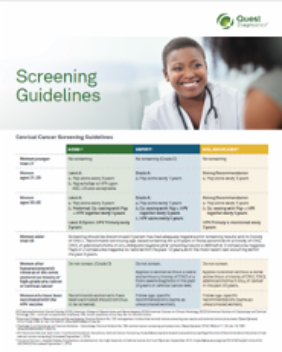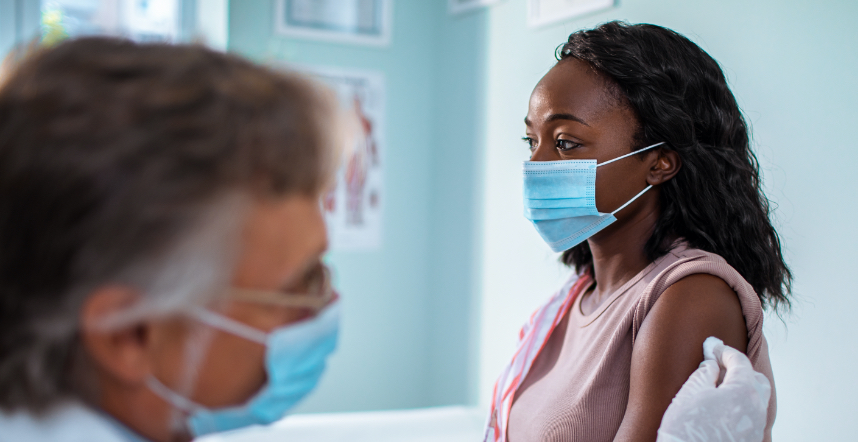Prenatal care is part of a healthy pregnancy and outcome
Insights and support for every step along the pregnancy journey
Your patient’s pregnancy can be a busy time with lots of testing. Our interactive test menu and resources can help you recommend the right tests at the right time.


Please select a trimester to view the corresponding test menu:
CORRESPONDING
QUEST TEST
RECOMMENDED LABORATORY SCREENING
OB Panel (can be ordered as a panel or individually)a
CORRESPONDING QUEST TEST
Obstetric Panel
TEST CODE
20210
RECOMMENDED LABORATORY SCREENING
OB Panel Individual components
CORRESPONDING QUEST TEST
CBC (includes Differential and Platelets)
TEST CODE
6399
CORRESPONDING QUEST TEST
Antibody Screen, RBC with Reflex to Identification, Titer, and Antigen Typingb
TEST CODE
795
CORRESPONDING QUEST TEST
ABO Group and Rh Type
TEST CODE
7788
CORRESPONDING QUEST TEST
RPR (Diagnosis) with Reflex to Titer and Confirmatory Testingb (nontreponemal screening for syphilis)
TEST CODE
36126
CORRESPONDING QUEST TEST
Hepatitis B Surface Antigen with Reflex Confirmationb
TEST CODE
498
CORRESPONDING QUEST TEST
Rubella Immune Status
TEST CODE
802
RECOMMENDED LABORATORY SCREENING
Obstetric Panel with Fourth Generation HIV Individual components
Additional OB Panel
CORRESPONDING QUEST TEST
This alternative panel is available and may be ordered to simultaneously screen for HIV infection, in addition to the tests above
Obstetric Panel with Fourth Generation HIV Individual componentsac
TEST CODE
93802
RECOMMENDED LABORATORY SCREENING
Additional OB Panel component
CORRESPONDING QUEST TEST
HIV-1/2 Antigen and Antibodies, Fourth Generation, with Reflexesb
TEST CODE
91431
RECOMMENDED LABORATORY SCREENING
Additional OB Panel
CORRESPONDING QUEST TEST
Obstetric Panel with Fourth Generation HIV, Hepatitis C Antibody with Reflex
TEST CODE
12075
RECOMMENDED LABORATORY SCREENING
Additional OB Panel component
CORRESPONDING QUEST TEST
Hepatitis C Antibody with Reflex to HCV, RNA, Quantitative, Real-Time PCR
TEST CODE
8472
Additional informative 1st trimester tests
RECOMMENDED LABORATORY SCREENING
Cervical cytology screening, if indicateda
CORRESPONDING QUEST TEST
Image-Guided Pap with Age-Based Screening Protocolsca
TEST CODE
91384
CORRESPONDING QUEST TEST
Image-Guided Pap with Age-Based Screening with CT/NGca
TEST CODE
91385
CORRESPONDING QUEST TEST
Image-Guided Pap with Age-Based Screening with CT/NG, Trichomonasca
TEST CODE
91386
CORRESPONDING QUEST TEST
Pap alone
TEST CODE
See note belowca
RECOMMENDED LABORATORY SCREENING
Urinalysis
Urinalysis/Urine culture
CORRESPONDING QUEST TEST
Urinalysis, Complete
TEST CODE
5463
CORRESPONDING QUEST TEST
Urinalysis, Complete, with Reflex to Culturebf
TEST CODE
3020
CORRESPONDING QUEST TEST
Culture, Urine, Routinef
TEST CODE
395
CORRESPONDING QUEST TEST
Urinalysis with Reflex to Microscopicb
TEST CODE
7909
RECOMMENDED LABORATORY SCREENING
Zika Testing
CORRESPONDING QUEST TEST
Zika Virus RNA, Qualitative, Real-Time RT-PCR
TEST CODE
93870
CORRESPONDING QUEST TEST
Zika Virus RNA, Qualitative, Real-Time RT-PCR Panel, Serum/Urine
TEST CODE
94221
Although rates of Zika virus infection have decreased in the United States, obstetrician–gynecologists and other healthcare providers should continue to assess their patients for potential exposure based on travel or sexual history and test symptomatic patients with possible exposure and pregnant women with ongoing exposure regardless of symptoms in accordance with the Centers for Disease Control and Prevention recommendations.1
One or both of the following screens for fetal aneuploidy should be offered during the 1st trimester
Fetal aneuploidy 1st trimester testing
RECOMMENDED LABORATORY SCREENING
First Trimester Screen
CORRESPONDING QUEST TEST
First Trimester Screen, hCG
The screen includes PAPP-A (Pregnancy-associated Plasma Protein-A), hCG, Nuchal Translucency (NT) test; and risk assessments for trisomy 21 and trisomy 18
TEST CODE
16145
RECOMMENDED LABORATORY SCREENING
Maternal Serum Screen (Part 1)
CORRESPONDING QUEST TEST
Stepwise, Part 1
The screen includes PAPP-A (Pregnancy-associated Plasma Protein-A), hCG, Nuchal Translucency (NT); and risk assessments for trisomy 21 and trisomy 18
TEST CODE
16463
CORRESPONDING QUEST TEST
Serum Integrated Screen, Part 1
PAPP-A (Pregnancy-associated Plasma Protein-A)
This screen includes PAPP-A; and risk assessments for trisomy 21 and trisomy 18 reported after Part 2
TEST CODE
16165
CORRESPONDING QUEST TEST
Sequential Integrated Screen, Part 1
This screen includes PAPP-A (Pregnancy-associated Plasma Protein-A), hCG, Nuchal Translucency (NT), Down syndrome, and trisomy 18 risk and interpretation
TEST CODE
16131
CORRESPONDING QUEST TEST
Integrated Screen, Part 1
This screen includes PAPP-A (Pregnancy-associated Plasma Protein-A) and Nuchal Translucency (NT)
TEST CODE
16148
RECOMMENDED LABORATORY SCREENING
Noninvasive prenatal screening
CORRESPONDING QUEST TEST
QNatal® Advanced
GDSP cfDNA Paneld
TEST CODE
92777
Available through CalGenetic Portal
RECOMMENDED LABORATORY SCREENING
Sex chromosome aneuploidies (SCAs) and microdeletions
CORRESPONDING QUEST TEST
CA SCA and Microdeletionsd
TEST CODE
12296
RECOMMENDED LABORATORY SCREENING
Sex chromosome aneuploidies (SCAs) only
CORRESPONDING QUEST TEST
CA SCAd
TEST CODE
12299
RECOMMENDED LABORATORY SCREENING
Diagnoistic Chromosomal Analysis via chorionic villus sampling (CVS), if indicated
CORRESPONDING QUEST TEST
Chromosome Analysis, Chorionic Villus Sample (CVS)
TEST CODE
14592
Informative infectious disease 1st trimester tests
Infectious disease 1st trimester tests
RECOMMENDED LABORATORY SCREENING
Tuberculosis (TB), if indicatedec
CORRESPONDING QUEST TEST
QuantiFERON®-TB Gold Plus, 1 Tube
TEST CODE
36970
CORRESPONDING QUEST TEST
QuantiFERON®-TB Gold Plus, 4 Tubes, Draw Site Incubated
TEST CODE
36971
CORRESPONDING QUEST TEST
T-SPOT®.TB
TEST CODE
37737
RECOMMENDED LABORATORY SCREENING
Chlamydiaed
CORRESPONDING QUEST TEST
Chlamydia trachomatis RNA, TMA, Urogenital
TEST CODE
11361
RECOMMENDED LABORATORY SCREENING
Gonorrhea, if indicatedfd
CORRESPONDING QUEST TEST
Neisseria gonorrhoeae RNA, TMA, Urogenital
TEST CODE
11362
RECOMMENDED LABORATORY SCREENING
Chlamydia and gonorrhea
CORRESPONDING QUEST TEST
Chlamydia/Neisseria gonorrhoeae
RNA, TMA, Urogenital
TEST CODE
11363
RECOMMENDED LABORATORY SCREENING
HIV testing
CORRESPONDING QUEST TEST
HIV-1/2 Antigen and Antibodies, Fourth Generation, with Reflexesb
TEST CODE
91431
RECOMMENDED LABORATORY SCREENING
Hepatitis C testing
CORRESPONDING QUEST TEST
Hepatitis C Antibody with Reflex to HCV, RNA, Quantitative, Real-Time PCRb
TEST CODE
8472
CORRESPONDING QUEST TEST
Hepatitis C Antibody with Reflex to HCV RNA,PCR w/Reflex to Genotype, LiPAb
TEST CODE
94345
RECOMMENDED LABORATORY SCREENING
Syphilis
CORRESPONDING QUEST TEST
Syphilis Antibody Cascading Reflex
TEST CODE
90349
Hereditary cancer risk assessment
ACOG recommends that OB/GYNs perform a hereditary cancer risk assessment to help identify patients who may be at risk of developing certain types of cancer.21 For patients with a family or personal history of breast or ovarian cancer, Ashkenazi Jewish ancestry, or other potential heritable conditions, genetic testing can provide valuable information to help inform the best treatment decisions. Our hereditary cancer testing is performed on a next-generation sequencing platform in conjunction with our proprietary software to allow for the most accurate identification of disease.
CDC screening guidelines for chlamydia and gonorrhea during pregnancy
All pregnant women aged <25 years, or older women at increased risk32 for infection, should be screened during their first prenatal visits.*
- Women found to have gonococcal infection should be treated immediately and retested within 3 months
- Those found to have chlamydial infection should have a test-of-cure (preferably by NAAT) 3 to 4 weeks after treatment and retested at 3 months
*Patients with increased risk are women with a history of multiple sexual partners or a sexual partner with multiple contacts, sexual contact with individuals with culture-proven STDs, a history of repeated episodes of STDs, or attendance at clinics for STDs.
QNatal® Advanced
GDSP cfDNA
QNatal® Advanced is a low-risk, noninvasive cell-free DNA (cfDNA) prenatal screen that can detect the most common fetal aneuploidies, including Down syndrome.
GDSP cfDNA Panel test code Available through CalGenetic Portal
CORRESPONDING
QUEST TEST
RECOMMENDED LABORATORY SCREENING
CBC
CORRESPONDING QUEST TEST
CBC (includes Differential and Platelets) This screen includes WBC, RBC, Hemoglobin, Hematocrit, MCV, MCH, MCHC, RDW, Platelet Count, MPV and Differential (absolute and percent neutrophils, lymphocytes, monocytes, eosinophils, and basophils)
TEST CODE
6399
CORRESPONDING QUEST TEST
CBC (H/H, RBC, Indices, WBC, Plt) This screen includes WBC, RBC, Hemoglobin, Hematocrit, MCV, MCH, MCHC, RDW, Platelet Count
TEST CODE
1759
CORRESPONDING QUEST TEST
Hematocrit
TEST CODE
509
CORRESPONDING QUEST TEST
Hemoglobin
TEST CODE
510
RECOMMENDED LABORATORY SCREENING
Gestational diabetes screening
CORRESPONDING QUEST TEST
Glucose Gestational Screen (50g), 135 Cutoff (ACOG supported 1st step of 2-step GDM evaluation)
TEST CODE
8477
CORRESPONDING QUEST TEST
Glucose Gestational Screen (50g), 140 Cutoff (ACOG supported 1st step of 2-step GDM evaluation)
TEST CODE
19833
CORRESPONDING QUEST TEST
Glucose Tolerance Test, Gestational, 4 specimens (100g) (ACOG supported 2nd step of 2-step GCM valuation)
TEST CODE
6745
RECOMMENDED LABORATORY SCREENING
Quad Screene
CORRESPONDING QUEST TEST
Quad Screen
This screen includes AFP, unconjugated Estriol, hCG, Dimeric Inhibin A, and risk assessments for trisomy 21, trisomy 18, and ONTD
TEST CODE
30294
RECOMMENDED LABORATORY SCREENING
Maternal Serum Screen (Part 2)
CORRESPONDING QUEST TEST
Serum Integrated Screen, Part 2 This screen includes AFP, hCG, uE3, and DIA
TEST CODE
16167
RECOMMENDED LABORATORY SCREENING
Stepwise, Part 2
CORRESPONDING QUEST TEST
This screen includes AFP, uE3, hCG, DIA, and PAPP-A, hCG, NT from Stepwise, Part 1; and risk assessments for trisomy 21, trisomy 18, and ONTD
TEST CODE
16465
RECOMMENDED LABORATORY SCREENING
Sequential Integrated Screen, Part 2
CORRESPONDING QUEST TEST
This screen includes AFP, uE3, hCG, DIA, and PAPP-A, hCG, NT from Sequential Integrated Screen, Part 1; and risk assessments for trisomy 21, trisomy 18, and ONTD
TEST CODE
16133
RECOMMENDED LABORATORY SCREENING
Integrated Screen, Part 2
CORRESPONDING QUEST TEST
This screen includes AFP, uE3, hCG, DIA, and PAPP-A, NT from Integrated Screen, Part 1; and risk assessments for trisomy 21, trisomy 18, and ONTD
TEST CODE
16150
RECOMMENDED LABORATORY SCREENING
Maternal Serum Alpha-Fetoprotein
CORRESPONDING QUEST TEST
Maternal Serum AFP
TEST CODE
5059
Available through CalGenetic Portal Under Diagnostic Chromosomal Analysis via amniocentesis
RECOMMENDED LABORATORY SCREENING
Diagnostic Chromosomal Analysis via amniocentesis or chorionic villus sampling, if indicatede
CORRESPONDING QUEST TEST
Chromosome Analysis, Chorionic Villus Sample
TEST CODE
14592
CORRESPONDING QUEST TEST
Chromosome Analysis, Amniotic Fluidb
TEST CODE
14590
Quanum® Interactive Insights™
Our enhanced reporting tool can help you have more meaningful conversations with patients about their lab test results. Learn more.
Obesity in pregnancy
More than half of pregnant women in the United States are overweight or obese,43 putting them at greater risk of pregnancy complications, such as gestational diabetes, preeclampsia, cesarean delivery, and giving birth to an infant with congenital anomalies. ACOG recommendations for counseling obese patients include:
- Discussing the increased risks to their baby
- Measuring their height and weight at their initial prenatal visit Guidelines that include a total weight gain of 15-25 lbs for overweight women (BMI=25-29.9) and 11-20 lbs for obese women (BMI≥30)
- Providing patients information on diet and exercise
CORRESPONDING
QUEST TEST
RECOMMENDED LABORATORY SCREENING
CBC
CORRESPONDING QUEST TESTS
CBC (includes Differential and Platelets)
This screen includes WBC, RBC, Hemoglobin, Hematocrit, MCV, MCH, MCHC, RDW, Platelet Count, MPV and Differential (absolute and percent neutrophils, lymphocytes, monocytes, eosinophils, and basophils)
TEST CODE
6399
CORRESPONDING QUEST TESTS
CBC (H/H, RBC, Indices, WBC, Plt)
This screen includes WBC, RBC, Hemoglobin, Hematocrit, MCV, MCH, MCHC, RDW, Platelet Count
TEST CODE
1759
CORRESPONDING QUEST TESTS
Hematocrit
TEST CODE
509
CORRESPONDING QUEST TESTS
Hemoglobin
TEST CODE
510
RECOMMENDED LABORATORY SCREENING
D (Rh) antibody screen
CORRESPONDING QUEST TEST
Antibody Screen, RBC with Reflex to Identification, Titer, and Antigen Typinge
TEST CODE
795
RECOMMENDED LABORATORY SCREENING
Group B streptococcal disease
CORRESPONDING QUEST TESTS
Streptococcus Group B Culture
TEST CODE
5617
CORRESPONDING QUEST TESTS
Streptococcus Group B with Susceptibility Culture
TEST CODE
15090
CORRESPONDING QUEST TESTS
Streptococcus Group B DNA,
PCR with Broth Enrichment
TEST CODE
91768
CORRESPONDING QUEST TESTS
Streptococcus Group B DNA, PCR with Broth Enrichment and Reflex to Susceptibilitye
TEST CODE
91770
RECOMMENDED LABORATORY SCREENING
Chlamydia (if patient tested positive or is high risk due to age or lifestyle)
CORRESPONDING QUEST TEST
Chlamydia trachomatis RNA, TMA, Urogenital
TEST CODE
11361
RECOMMENDED LABORATORY SCREENING
Gonorrhea (if patient tested positive or high risk due to age or lifestyle)
CORRESPONDING QUEST TEST
Neisseria gonorrhoeae RNA, TMA, Urogenital
TEST CODE
11362
RECOMMENDED LABORATORY SCREENING
Chlamydia and gonorrhea (if patient tested positive or high risk due to age or lifestyle)
CORRESPONDING QUEST TEST
Chlamydia/Neisseria gonorrhoeae
RNA, TMA, Urogenital
TEST CODE
11363
RECOMMENDED LABORATORY SCREENING
RPR (if patient tested positive or high risk due to age or lifestyle)
CORRESPONDING QUEST TEST
RPR (Diagnosis) with Reflex to Titer and Confirmatory Testinge
TEST CODE
36126
RECOMMENDED LABORATORY SCREENING
HIV testing (if patient is high risk due to lifestyle)
CORRESPONDING QUEST TEST
HIV-1/2 Antigen and Antibodies, Fourth Generation, with Reflexesb
TEST CODE
91431
Retesting for chlamydia and gonorrhea is important for those at increased risk
Those aged <25 years and those at increased risk* for chlamydia or gonococcal infection should be retested during their 3rd trimester.32
*Patients are women with a history of multiple sexual partners or a sexual partner with multiple contacts, sexual contact with individuals with culture-proven STDs, a history of repeated episodes of STDs, or attendance at clinics for STDs.
a The age-based offerings are based on ACOG recommendations and include image-guided Pap tests. Non-imaged Paps as well as conventional Paps are also available at Quest Diagnostics. Test codes may vary by location. Please contact your local laboratory or go to QuestDiagnostics.com/TestCenter for more information.
b Reflex testing may be performed at an additional charge.
c Risk factors include known HIV infection; close contact with individuals known or suspected to have TB; medical risk factors such as diabetes, lupus, cancer, alcoholism, and drug addiction; birth in or emigration from countries with high prevalence; being medically underserved; homelessness; living or working in long-term care facilities, such as correctional institutions, mental health institutions, and nursing homes.
d If positive, test-of-cure should be performed within 3-4 weeks post-treatment.
e If Antibody Screen is positive, Antibody Identification, Titer, and Antigen Typing will be performed at an additional charge. If RPR screen is reactive, RPR Titer and FTA Confirmatory testing will be performed at an additional charge. When only a single test, Hepatitis B Surface Antigen, is ordered to diagnose Hepatitis B in a pregnant woman, additional tests such as liver enzymes should be ordered to confirm the diagnosis.
a If Antibody Screen is positive, Antibody Identification, Titer, and Antigen Typing will be performed at an additional charge. If RPR screen is reactive, RPR Titer and FTA Confirmatory testing will be performed at an additional charge. When only 1 test, Hepatitis B Surface Antigen, is ordered to diagnose Hepatitis B in a pregnant person, additional tests such as liver enzymes should be ordered to confirm the diagnosis.
b Reflex testing may be performed at an additional charge.
c The age-based offerings are based on ACOG recommendations and include image-guided Pap tests. Non-imaged Paps as well as conventional Paps are also available at Quest Diagnostics. Individual panel components can be ordered separately.
d The GDSP (Genetic Disease Screening Program) cfDNA Panel is a cell-free DNA test that can screen for increased risk of trisomy 21, trisomy 18 and trisomy 13, which are fetal chromosomal abnormalities that may cause birth defects. It can also screen for fetal sex, if elected. Supplemental cfDNA screening is also available for sex chromosome aneuploidies (SCAs) and/or microdeletions. The GDSP cfDNA Panel, as well as the supplemental tests for SCA and/or microdeletions, are “screening” tests, not a diagnostic tests, and therefore all positive (ie, increased risk) results should be followed by genetic counseling and further diagnostic testing and procedures, when clinically indicated. Pregnancy management decisions should not be based on the results of a cfDNA test alone. As with any test, there may be false positives or false negatives. The positive predictive value of the screening test varies by genetic marker, and may be lower for rare conditions. Performance data for the GDSP cfDNA Panel and for the supplemental screening tests may be obtained by contacting Quest Diagnostics at 1.866.GENE.INFO (1.866.436.3463).
e Risk factors include known HIV infection; close contact with individuals known or suspected to have TB; medical risk factors such as diabetes, lupus, cancer, alcoholism, and drug addiction; birth in or emigration from countries with high prevalence; being medically underserved; homelessness; living or working in long-term care facilities, such as correctional institutions, mental health institutions, and nursing homes.
f If positive, test-of-cure should be performed within 3-4 weeks post-treatment.
Test codes may vary by location. Please contact your local laboratory for more information.
Download our pregnancy journey brochure
Download our pregnancy journey brochure
References:
- The American College of Obstetricians and Gynecologists (ACOG). ACOG committee opinion no. 634: hereditary cancer syndromes and risk assessment. Obstet Gynecol. 2015;125(6):1538-1543.
- ACOG. Guidelines for women’s healthcare, a resource manual, fourth edition 2014.
- ACOG. ACOG committee opinion no. 549: obesity in pregnancy. Obstet Gynecol. 2013;121(1):213-217. doi:10.1097/01.aog.0000425667.10377.60

Genetic consultation available
Genomic science specialists are available to help with test selection and results interpretation 1.866.GENE.INFO (1.866.436.3463)



